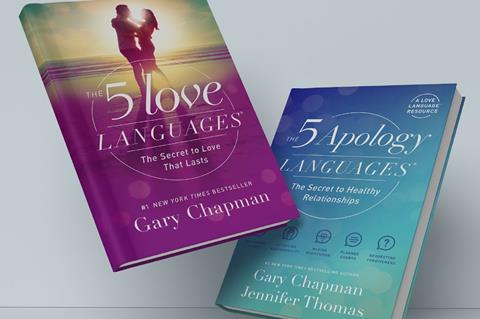Premier’s Inspirational Breakfast host Esther Higham spoke to Dr Gary Chapman, author of the New York Times bestselling The 5 Love Languages® series, about his latest book The 5 Apology Languages.

EH: The title of your new book, The 5 Apology Languages (Moody Publishers), reminded me of an incident with my daughter when she was probably just about two. We started to say sorry for something and she said: “Not Sorry. Me.” There’s something very profound in that. It is difficult to say sorry – why is that?
GC: Most of us don’t like to admit that we’re wrong, or we’ve done something wrong or said something wrong. Because we want to be accepted. By nature, when we realise we’ve done wrong, we feel guilty. I think that’s a gift of God, because the guilt is designed to turn us to seek reconciliation.
The tragedy in our day is that we haven’t accepted the biblical concepts of what is right and what is wrong. And consequently, if you don’t have that, then whatever you want to do is what you do. But when we fracture a relationship, unless we deal with it, the relationship is not going to get better because it puts a barrier between us. And that’s why apology and forgiveness are necessary if we’re going to have a long-term relationship that’s healthy.
EH: How do we apologise well?
GC: There are different ways to apologise – and that’s what I deal with in the book. People have a different idea of what a sincere apology is. For some it is expressing regret, often with the words: “I’m sorry”, but don’t just use those words – tell the person what you’re sorry for. Another is about accepting responsibility: “I should not have done that; I take full responsibility”. And then there’s offering to make restitution: “How can I make this right? What can I do to make up for what I’ve done?” And another one is that we also express the desire to change our behaviour.
For some people, if you don’t express the desire to change your behaviour, then they don’t feel like you’re sincere. Repentance, of course, is big in the Bible; to turn away from the wrong. The last one is actually requesting forgiveness: “Will you forgive me?”; “I hope you can find it in your heart to forgive me.” So, every one of us has an idea of what a sincere apology is and it will involve some of those things, not necessarily all of them.
EH: What about in a marriage, where there’s been a really big issue of infidelity, or addiction or misuse of money?
GC: With those huge issues, there has to be genuine repentance, otherwise the person is going to have a hard time forgiving them at all, because they just continue to do the same thing. Even if you choose to forgive them of, let’s say, infidelity. They repent, they turn back, they’re asking forgiveness and you choose to forgive them. But here’s the issue: forgiveness does not restore trust.
I say to a person that’s been unfaithful: “If you want them to trust you again, then you’ve got to be trustworthy. You need to have the attitude of: ‘You can look at my computer anytime you want to. I don’t want to ever hurt you again.’ You take that approach, and they will come to trust you again.” Forgiveness opens the door to the possibility that trust can be reborn. But it takes time for trust to be rebuilt.
EH: It’s over 30 years since you first published The 5 Love Languages (Moody Publishers). To date it’s sold 20 million copies and been translated into dozens of languages. So much has changed in the landscape of marriage and relationships in that time, so why is a simple set of five love languages still working?
GC: There’s no question that things are very, very different, but we’re still human. And humans still have the need to feel loved by the significant people in their lives. Much of what’s going on in our culture is because we have divorced ourselves from loving, caring, committed relationships. We’re seeking to find meaning in life in other places. But God made us to have a deep relationship in marriage. He instituted marriage to be a loving, supportive, caring relationship. But many people grew up in a home where they didn’t see that.
Their parents divorced and then they say: “I don’t want to get married. I don’t want to put anybody through what my parents went through.” I don’t want to put anybody through what my parents went through.” Well, we don’t have to repeat the past; every generation has an opportunity with God to create something good. That’s why the book is still pertinent. And of course, it applies not only in marriage relationships; it applies in any close human relationship, because we all have the need to feel loved.
EH: I’ve been married 21 years now and we learned about the love languages early on in our relationship but I did the quiz the other day preparing for this interview, and my love language seemed to have changed. Can your love language change?
GC: I think it can. It does tend to stay with us for a lifetime, like other personality traits. But I do think that certain seasons of life, or certain circumstances, might cause another love language to jump to the top. For example, for a mother that has two preschool children, acts of service might not be her primary language, but, during those years, it probably is going to become her love language.
EH: You’ve been married for over 60 years. Do you use the love languages?
GC: Yes, we are still very much plugged into this. Her language is acts of service. That’s why I wash the dishes. Every night, I load the dishwasher. Every morning, I vacuum the floors, I take out the trays, and whatever else she asked me to do. My language is words of affirmation. She tells me that I’m the best husband in the world, which I know is a hyperbole, but it still feels good to me. I wrote a book called Married And Still Loving It: The joys and challenges of the second half (Moody Press). What we tried to figure out is: what are the characteristics of the people that thrive and those who just survive?
One of those differences is that those who thrive have learned each other’s love language and they speak it as a regular way of life. The way my wife loads the dishwasher irritated me to death because she loads it like she’s playing Frisbee. She just throws them in there. And I believe everything has a right place. One day she said: “Honey, if it’s so important to you, why don’t you load the dishwasher?” So I started loading the dishwasher.
My suggestion is if you can change things to be more pleasant to your spouse, why not change those things? But there will be some things that they either cannot change, or choose not to change. We do have to come to accept the humanity of our spouse; that they will never do everything the way we would like it to be done.
To listen to the full interview visit here.
































No comments yet